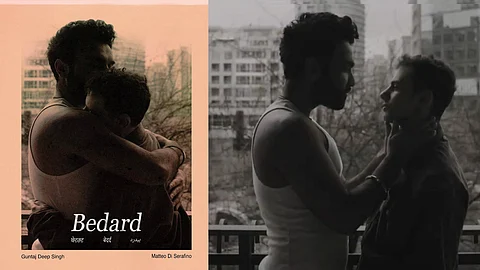
- HOMEGROWN WORLD
- #HGCREATORS
- #HGEXPLORE
- #HGVOICES
- #HGSHOP
- CAREERS
- ABOUT US
- CONTACT US

Bedard refers to a person who is depicted as unsympathetic and difficult to like, embodying unpleasant qualities. Within the context of this new poignant gay short film, the term takes on a new, intriguing nuance.
In the short film, director Guntaj Deep Singh creates a narrative that delves into the complexities of human connection, desire, and the aftermath of intimate encounters. Right from the outset, the inclusion of a Joan Didion quote (who also happens to be my favourite author) immediately establishes an emotional resonance. This choice of epigraph sets the tone, hinting at the nature of memories and the fragility of our emotional landscapes.
The central thematic conflict between nihilism and romanticism is introduced early on, embodied by the characters of Rajan and Charles. Rajan, portrayed as the romantic, embodies the sentimental and emotional side of human experiences, while Charles takes on the role of the realist, advocating for a more pragmatic, albeit harsh, perspective on life. This clash of philosophies forms a significant undercurrent, foreshadowing the emotional turbulence that is to come.
The morning after their one night stand, Rajan's solitude and confusion are palpable, painted through the film's visuals and the actor's performance. The absence of Charles and the discovery of a note leaves Rajan in a state of emotional disarray, exposing the vulnerability that lingers beneath the surface. This sequence effectively portrays the disheartening aftermath of a brief, passionate connection, where one party was left longing for something more.
The inclusion of a flashback, where the characters engage in a philosophical debate, further deepens the exploration of their differing worldviews. Charles, representing the realist, asserts that life lacks inherent meaning, but introduces an element of agency with the concept of choice. This dialogue serves as a reflection on the complexities of existence and human agency, adding depth to the characters and their perspectives.
Singh's direction shines in capturing the raw emotions of the characters (himself included), particularly Rajan's introspective moments. The film's intimate portrayal of vulnerability is its strength, allowing viewers to empathize with the protagonist's plight. The choice to leave certain questions unanswered, mirroring life's inherent ambiguity, is a bold yet effective narrative choice. It challenges the notion that closure is always necessary, inviting the audience to reflect on the unspoken and the unexplored.
The film's primary focus on the aftermath of a one-night stand offers a rare and refreshing perspective. It unearths the emotional complexities that can arise from such encounters, dispelling the notion that they are devoid of consequence. More than that, it's an examination of how two people can look at the same phenomenon so differently which highlights the richness and complexity of individual perspectives. Bedard serves as a compelling study on the subjectivity of human experience.
Through nuanced performances, poignant dialogue, and evocative visuals, the film invites viewers to reflect on the complexities of existence and the varying lenses through which we perceive the world. Singh's directorial prowess, coupled with the film's thematic depth, makes Bedard a commendable addition to the realm of short cinema.
Born and raised in Punjab, India, Guntaj Deep Singh is a self-taught visual artist, photographer, and filmmaker. Bedard will be available for public viewing online next year. Follow Guntaj Deep Singh here.
